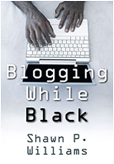Shawn Williams for Dallas Morning News: A challenge to blacks about gay men
Here’s a column that I wrote for the Dallas Morning News that will appear in Saturday’s paper. It’s already available at DallasNews.com. Thanks to Sharon Grigsby for allowing me to step a bit outside of my comfort zone as a writer. As usual, I’m not thrilled about the title, but I’m happy with the way the column turned out. Interested in seeing what type of feedback this column receives.
Is it possible to support both the concept of Proposition 8 and the men and women whose lives were most affected by it? I hope so; I might well have voted for the California measure in November.
That would put me among the many African-Americans harshly criticized by the anti-Prop 8 side for playing a role in its passage. Even casual readers of news are aware that the vote has led to months of tension between blacks and the GLBT (gay, lesbian, bisexual and transgender) community.
One group with a foot in both camps are gay black men. While others of us fight over the rights of couples to live their lives together in peace, these men often are fighting for their lives in solitude.
The shocking rise in the number of black women affected by HIV/AIDS is well documented – and rightfully so. African-American females are 23 times as likely to contract HIV as their white counterparts.
But at the same time, black men who are HIV-positive receive little media attention. Worse, they are often portrayed as the enemy when it comes to the spread of HIV/AIDS. “Brothers on the down low,” men who secretly have sex with other men while living in a committed heterosexual relationship, certainly invite no sympathy. These men too often contract HIV and then infect their unwitting female partners.
But all the publicity around these MSMs (men having sex with men) has left in the shadows black men who recognize they are gay and need help with HIV/AIDS-related education and services.
Because of the particularly negative stigma that is attached to homosexuality by many African-Americans, men are often shunned by family and friends once they fully embrace a gay lifestyle. And the one place that has always been there for black men and women – the black church – is the last place where gay men would seek help or encouragement.
And who can blame them? We black Christians too often act as if sex doesn’t exist outside of the marriage bed. We say nothing about our girls having babies at rates that exceed the national average, and the silence is just as loud about our boys contracting deadly diseases.
The Rev. James Fitzgerald, who directs pastoral care at Friendship-West Baptist Church, says this has to change. “God is love,” says Fitzgerald, “and it’s an encompassing love.”
Fitzgerald has had to deal with his own biases while becoming more involved with outreach work to help this community. “The church has to bring the issue of homosexuality to the forefront and become a resource to individuals and families.”
Many black men are just as reluctant to seek assistance from established mainstream resource centers. A gay friend recently told me that while the white GLBT community is well meaning, too often resource providers can’t fathom the unique plight of gay black men.
Additionally, just as I enjoy hearing music that I’m familiar with at the grocery store or greeting card assortments that include faces that resemble mine, gay men need a comfort zone of familiarity when they seek assistance. The educational materials, pictures on the wall and the people working in the office can create an atmosphere much more appealing to those reluctant to seek help. Just as churches need to rethink how they can best help, so do service providers.
Given that half of all new HIV cases in the United States are in African-Americans, it’s critical that all of us leave denial behind and figure out how we can help gay black men live healthy, HIV/AIDS-free lives.




